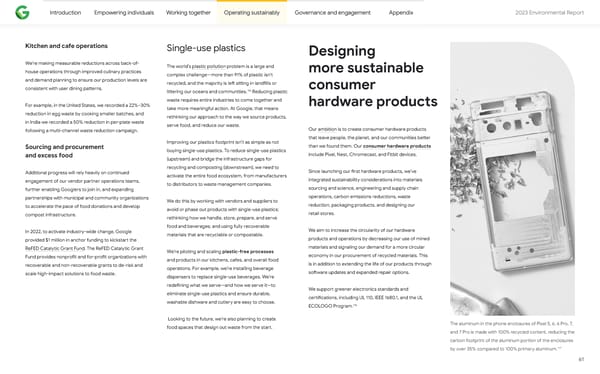Introduction Empowering individuals Working together Operating sustainably Governance and engagement Appendix 2023 Environmental Repo爀琀 Kitchen and cafe operations Single-use plastics Designing We’re making measurable reductions across back-of- The world’s plastic pollution problem is a large and more sustainable house operations through improved culinary practices complex challenge—more than 91% of plastic isn’t and demand planning to ensure our production levels are recycled, and the majority is le昀琀 si琀琀ing in land昀椀lls or consumer consistent with user dining pa琀琀erns. 115 li琀琀ering our oceans and communities. Reducing plastic waste requires entire industries to come together and hardware products For example, in the United States, we recorded a 22%–30% take more meaningful action. At Google, that means reduction in egg waste by cooking smaller batches, and rethinking our approach to the way we source products, in India we recorded a 50% reduction in per-plate waste serve food, and reduce our waste. Our ambition is to create consumer hardware products following a multi-channel waste reduction campaign. that leave people, the planet, and our communities be琀琀er Sourcing and procurement Improving our plastics footprint isn’t as simple as not than we found them. Our consumer hardware products buying single-use plastics. To reduce single-use plastics include Pixel, Nest, Chromecast, and Fitbit devices. and excess food (upstream) and bridge the infrastructure gaps for recycling and composting (downstream), we need to Since launching our 昀椀rst hardware products, we’ve Additional progress will rely heavily on continued activate the entire food ecosystem, from manufacturers integrated sustainability considerations into materials engagement of our vendor pa爀琀ner operations teams, to distributors to waste management companies. sourcing and science, engineering and supply chain fu爀琀her enabling Googlers to join in, and expanding operations, carbon emissions reductions, waste pa爀琀nerships with municipal and community organizations We do this by working with vendors and suppliers to reduction, packaging products, and designing our to accelerate the pace of food donations and develop avoid or phase out products with single-use plastics; retail stores. compost infrastructure. rethinking how we handle, store, prepare, and serve food and beverages; and using fully recoverable We aim to increase the circularity of our hardware In 2022, to activate industry-wide change, Google materials that are recyclable or compostable. products and operations by decreasing our use of mined provided $1 million in anchor funding to kicksta爀琀 the materials and signaling our demand for a more circular ReFED Catalytic Grant Fund. The ReFED Catalytic Grant We’re piloting and scaling plastic-free processes economy in our procurement of recycled materials. This Fund provides nonpro昀椀t and for-pro昀椀t organizations with and products in our kitchens, cafes, and overall food is in addition to extending the life of our products through recoverable and non-recoverable grants to de-risk and operations. For example, we’re installing beverage so昀琀ware updates and expanded repair options. scale high-impact solutions to food waste. dispensers to replace single-use beverages. We’re rede昀椀ning what we serve—and how we serve it—to We suppo爀琀 greener electronics standards and eliminate single-use plastics and ensure durable, ce爀琀i昀椀cations, including UL 110, IEEE 1680.1, and the UL washable dishware and cutlery are easy to choose. 116 ECOLOGO Program. Looking to the future, we’re also planning to create The aluminum in the phone enclosures of Pixel 5, 6, 6 Pro, 7, food spaces that design out waste from the sta爀琀. and 7 Pro is made with 100% recycled content, reducing the carbon footprint of the aluminum po爀琀ion of the enclosures 117 by over 35% compared to 100% primary aluminum. 61
 2023 Environmental Report Page 60 Page 62
2023 Environmental Report Page 60 Page 62